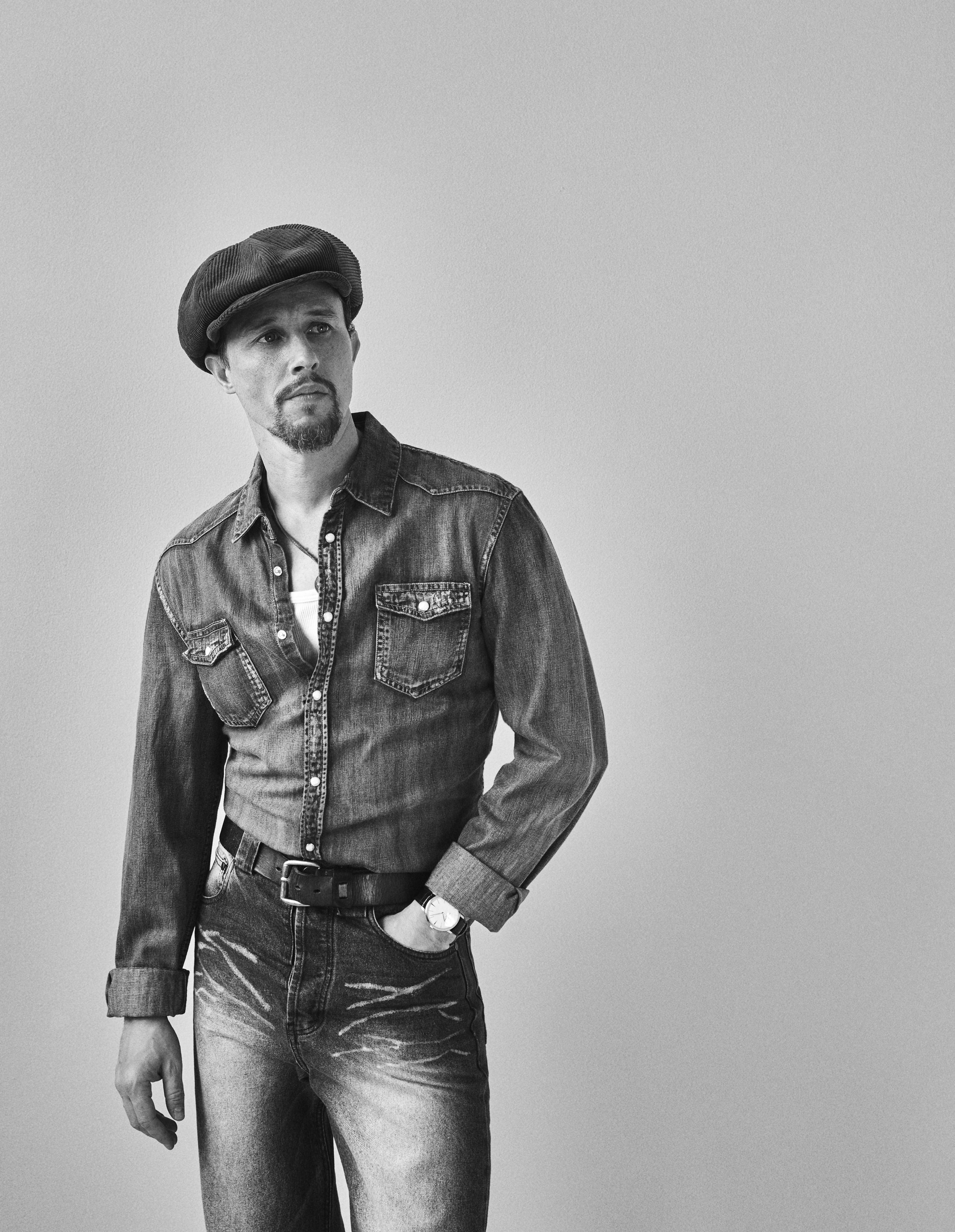“I always have a theme of darkness and light within my music. My youth taught me to seek light even in the darkest places.”
Hat FRIED RICE, shirt J. LINDEBERG, watch VACHERON CONSTANTIN, pants and shoes STYLIST'S OWN.
JP Cooper is known in the British music scene for his soulful lyrics and rich, heartfelt vocals that transcend time and dimension. With hit singles like September Song and Perfect Strangers, he has captured the attention of listeners worldwide. Drawing inspiration from his upbringing in Manchester and the strength of his family, JP's music explores the themes of darkness and light, finding hope even in the darkest of places. With his emotive, vulnerable approach, he reaches for the unseen and ethereal, connecting listeners to the raw depth of human emotion. Blending elements of soul, folk, and pop, JP Cooper's music is both timeless and contemporary, resonating with fans across generations.
Shivani Somaiya __ Let's run it all the way back: Can you remember your first memory of creating music? How old were you?
JP Cooper __ I remember sitting in the back of the car with my dad and listening to the radio, singing along to the radio, and thinking that I could sing. I know that’s not making music, but I always thought, “I can sing,” but never thought of pursuing it at that point. When I became a teenager, I got into writing. One of my teachers told me: “You can write a story about anything,” I loved the idea of just getting into my imagination and writing things. And then, a lot of it was coming of age in Manchester, through early teens. That was kinda when Oasis were releasing their biggest records; all of a sudden, my friends started having guitars in the house, so it was kind of accidental. Then, the two [music and writing] just came together, and quickly, I was a writer more so than somebody who would learn covers. I just wanted to write my own songs.
Shivani Somaiya __ You talk about your childhood and this coming of age in Manchester; what was it like growing up in Manchester then? And how have those influences played a part in your music production making process?
JP Cooper __ If it weren’t for Manchester, maybe I would have never discovered music as an outlet. My biggest influences, however, were my childhood and the situation I found myself in, namely being broke and watching my dad grieve the loss of my mum. And basically, the strength it takes to bring a family together, hold a family together, and keep moving forward. That’s why I always have a real theme of darkness and light within my music. I think my youth taught me to seek light even in the darkest places. That is something that will always stick with me. It’s giving me this appreciation for music that gives people hope. That’s the most prominent thread that runs through what I do. You won't find many songs I've done coming from a place of negativity. Now and again, it's good to embrace the darker parts of things, but I tend to try and focus on enough light being in there.
Shivani Somaiya __ You talked about not thinking about pursuing music back then; how and when did you know, “ok, this is something I can do full-time.” Did you have an ah-ha moment?
JC __ Very, very quickly. I remember when I started making songs with my friends in high school. I remember we were recording songs before my voice broke. I remember that none of us could really play the instruments. It was a very working class background; nobody had money to send their kids to music lessons.
Hat FRIED RICE, shirt STYLIST'S OWN, pants WILLY CHAVARIA, watch VACHERON CONSTANTIN.
Hat STETSON, jacket PRIVATE WHITE V.C, trousers and shirt NIGEL CABOURN.
From one week to the next, we will be playing these songs, and I can remember turning around and telling my band mate “You couldn’t play that beat last week; what have you been doing? Why haven’t you been rehearsing?” He was really into the Foo Fighters and said, “Jesus JP, we’re not gonna be the next Foo Fighters. We’re just having a bit of fun, chill out”. And I was like: “We’re just 15, who says?” Right from that age, I remember being like, “Why not?” What's there to say that we can't aim for this to be a career or a place in the world? So I think I was quite stubborn, and when I got my teeth into something, I wasn’t letting go.
Shivani Somaiya __ In your music, I pick up influences of soul music. You have done a couple of gospel versions of your songs. Where does that come from? Which musical accolades do you borrow your sound from?
JP Cooper _ Strangely enough, my house wasn't a very musical household. There was a lot of art. My mum and dad met at art school, so there were a lot of paintings and things like that. They were both art teachers. After my mum died, my dad was left with five children to care for, so he stopped working. It was a rough time for my dad, so there wasn't much music around the house. I remember a few records that he used to play, one of them was the Drifters. That was early soul, touching on R&B, old R&B. The songs were very much romantic. I used to love that. I could still sing all of those records back-to-back. The first thing that I really got into, and it was more through my friends, was guitar music. I always found myself preferring the MTV unplugged versions; when they did the acoustic songs, So I started digging more into it, and that’s how I found R&B, soul, and blues music. I eventually joined a gospel choir. All through my twenties, I sang in a gospel choir. All of those arrangements that we did, I did with a guy named Wayne, who ran that gospel choir. He's been a great mentor of mine. He liked to throw me in the mix with the soloist here and there, throwing me in deep water to see if I could swim. I was always kind of semi-introverted, so it was pulling me out of my shell to get used to taking that lead position. And that was my journey to finding an expression that works for me and I really enjoyed that.
Shivani Somaiya __ How has grief influenced your sound and lyricism?
JP Cooper _ My mum died when I was 11 months old. I grew up watching my family recovering from that tragedy, but not really knowing that wasn't what a typical family was like.
“It’s the artist's job to be as vulnerable as possible and open to everything.”
I realized my house was different when I started getting older and attending school and playdates. I never felt less than though. My dad made it very clear that although my mom wasn’t there physically, she was always present with us. So I had this insight into another world, a world that you can't see nor touch. And that was the beauty of music when I discovered it because that was another thing you couldn't see nor touch but could feel. I never really felt the impact of that grief as my sisters did; it was a kind of an understanding little by little, and feeling that lack and that loss, and the more you learn, the more is revealed to you. It made me think a lot more deeply about people’s emotions. Seeing my dad vulnerable and broken. Now he is great, he is content, he is happy, and he is at peace with it, but for many years he wasn’t. Not many boys see their father cry. I actually think of that as a bit of a blessing, having that understanding. Of course, I would have wanted to have mom around, but there are a lot of blessings that I’ve taken out of my faith that she is watching out for me. I'm grateful for the way my dad helped me navigate that. It definitely opened me up to emotions. Music became therapeutic. Music became a way I could speak to this unseen world. In my song Raised Under Grey Skies, I say: “I hear the sound of your voice in music, I speak with you every day.”
Shivani Somaiya __ Why is it important for you as a father to showcase vulnerability through music? Why approach it even if it's not what the commercial industry or music wants from you?
JP Cooper __ Regardless of the commercial world, that's the artist's job to be as vulnerable as possible and open to everything. I don't know whether I'll fully reach the level that I would like to, but that's a constant pursuit that has to happen. I'll admit there have been times when I've been swayed and crippled by that pressure and almost fallen out of love with what I do. In a way, COVID was this opportunity for me to stop and be like, "Wait, why am I not happy?" Now I've very much tried to realign myself with that understanding of above everything else; that's my job.
Shivani Somaiya __ Talk to me about your creative process. How do you go from ideation to conception, production, and execution? Has that process ever changed?
JP Cooper __ It's changed a lot, and it continues to change. I'm still experimenting now. With this particular album that I'm working on currently, I wanted to approach everything in the most simple way. I didn't want to do any production at the front end. I’m trying to lean into simple orchestration before taking it to a place where I can produce it. In the past, I found myself falling into this trap of working with producers, which would turn into something that didn’t necessarily have my DNA running through it.
Hat FRIED RICE jacket STYLIST'S OWN.
Hat BATES HATTERS OF LONDON, waistcoat ARMANI.
Whereas now, I'm learning that it starts with a hundred percent of my DNA. Only then will I reach out to people who can help me dig deeper. Usually, the more people I bring into the process, the better it gets.
Shivani Somaiya __ Without giving too much away, can you tell me the creative intention behind your upcoming album? Are you experimenting with any new sounds?
JP Cooper _ We're still in the process of writing, and I've got a bunch of songs. I've been way more hands-on with every part of this record. The first album, Raised Under Grey Skies, happened, the success happened, and I was treading water for a long time. The second album, She, was me working my way through that. And I almost feel like these gospel versions that we did were me trying to prove to myself that if I followed my nose and worked with my people, I could create something incredible. Now I'm just trying to build on that and find my true voice within what I do. My new album will be very intimate but emotionally large. My goal hasn't been to make people dance, but it's been to open people.
Hat MELKE, top and pants NANUSHKA.
Hat STETSON, suit J. LINDEBERG, shirt FRIED RICE.
“My new album will be very intimate but emotionally large. My goal hasn't been to make people dance, but it's been to open people.”
Hat FRIED RICE jacket and pants STYLIST'S OWN.
Hat FRIED RICE, shirt CASABLANCA.
Photography Kailas, Creative director & Stylist Paco Lampecinado, Grooming Maria Ortenga, Interview Shivani Somaiya, Assistants Maryjo Hingano and Joe Saan, Talent JP Cooper.











